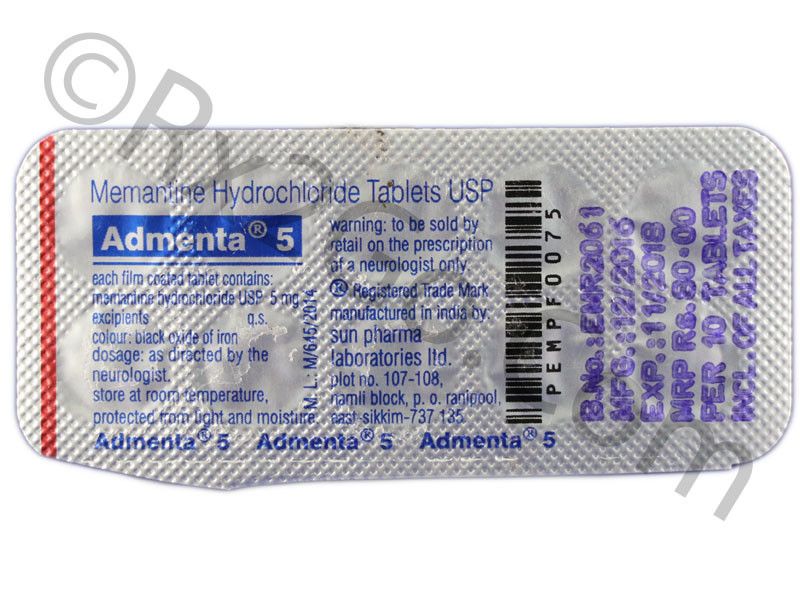Treat Moderate to Severe Dementia

Memantine is an NMDA receptor antagonist. It is used to treat moderate to severe dementia caused by Alzheimer’s disease (AD). It works by decreasing the abnormal activity in the brain. This oral tablet is available as a brand and generic version in different formulation for easy administration. Compared with other medications in treating Alzheimer’s disease, this drug has fewer side effects.
Memantine can be used as part of combination therapy. You need to take this with other medications in treating dementia associated with Alzheimer’s disease. However, this medicine can help slow down the progression of symptoms of moderate to severe AD, but it will not cure it.
What condition does Memantine treat?
Memantine is used for the treatment of moderate to severe dementia associated with Alzheimer’s disease especially for those who are intolerant of or have a contraindication to acetylcholinesterase inhibitors such as Donepezil.
Studies have demonstrated that this drug causes a small improvement in the daily and cognitive function (such as learning, thinking, and memory) among those who have dementia. Dementia is a general term for symptoms that affect mental cognitive tasks such as reasoning, memory, and thinking. It can occur due to a variety of conditions, but the most common is Alzheimer’s disease. Dementia is not a normal part of aging. It happens when there are damages in the brain cells that affect the ability to communicate. As it progresses, it can have a huge impact on the ability to become independent.
Early symptoms of dementia-like forgetfulness can be mild and easy to overlook. As it progresses, confusion and forgetfulness grow. People with dementia find it difficult to recall names and faces while personal care becomes a problem. Signs of dementia include poor decision-making, repetitious questioning, and inadequate hygiene. The behavior continues to change and can turn into aggression and depression.
How does Memantine work?
- There is increasing evidence that dementia associated with Alzheimer’s disease are due to the errors of the signals that pass messages between the brain and the nerve cells.
- Although the cause of Alzheimer’s disease is not fully understood, it is believed that dementia is due to the excessive activity of glutamate, a natural chemical produce by the body that contributes to the symptoms and progression of Alzheimer’s disease.
- Glutamate acts on the NMDA receptors found on the nerve cells in the brain. Memantine blocks the excessive activity of glutamate and further damage to the nerve cells but still allows some normal activation of the receptors. This decreases the harmful effect of glutamate in the brain and may help improve your symptoms of dementia.
What is the dosage of Memantine?
- Your dose can be different from other patients. You must follow your doctor’s order or the direction on the prescription label.
- The typical starting dose in treating dementia associated with Alzheimer’s disease among adults is 5 mg a day. Your doctor may likely to increase your dose to 5 mg two times a day or higher. The maximum recommended dose is 20 mg a day.
- Patients with kidney problems should need a lower dose.
How to take Memantine?
- Swallow the tablet whole with plenty of water.
- Take Memantine regularly. To help you remember your dosing schedule, take it at the same time each day.
- Your doctor may start giving you a low dose and may adjust your dose over time. Your initial dose will ultimately be the smallest effective dose.
- You may take this medicine with or without food.
- Take it exactly as directed. Do not take more or less than what is prescribed to you.
- If you forget to take your dose at the usual time, leave it. Continue with the regular dosing schedule the next day.
What are the precautions in taking Memantine?
- Use this with caution among patients with:
- Epilepsy
- Heart failure
- Heart attack
- High blood pressure
- Severe infections of the urinary tract with Proteus bacteria
- Kidney problems
- Do not use this among people with:
- Decrease liver function
- Who are pregnant or breastfeeding unless deemed necessary
- Allergic to any of its ingredients
- Inform your doctor if:
- You have a urinary tract infection
- You ever had a seizure
- You have difficulty urinating
- You have liver disease
- You are having surgery including dental procedures
- This medication may help improve the ability of a person with AD to think and remember but it will not cure it or prevent the loss of these abilities in the future.
- Do not stop taking this medicine without informing your doctor. Continue taking it even if you feel well.
- Using Memantine for a long time is fine as long as it is producing a good effect. However, your doctor will have to assess you regularly.
- Doctors will only prescribe Memantine if the patient has a caregiver available to monitor the patient and see to it that the patient is taking the medicine.
- Avoid substantial changes to a patient’s diet like shifting from meat-eating to a strict diet or vice versa as this can affect the removal of the drug from the body.
- This medicine can interact with several other medications, which can cause different side effects. Tell your doctor if you are using any other medication including prescription and non-prescription drugs, vitamin, minerals, and herbal supplements.
Costs of Generic Memantine vs. Namenda
The generic Memantine is a cheaper drug for the treatment of dementia symptoms associated with Alzheimer’s disease. It is cheaper than the branded counterpart Namenda. The generic Memantine 10 mg cost $0.97 per unit price or $58 for 60 tablets. While the brand name Namenda 10 mg cost $7.59 per unit price or $455.40 for 60 tablets.



